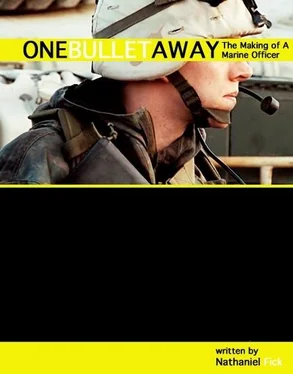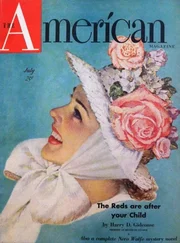HALFWAY THROUGH OCS, I was in the spotlight. I couldn’t march, failed to appreciate the importance of aligning the right edge of my belt buckle with the right edge of the top button of my trousers, and had a masochistic reaction to being screamed at: I stared into my assailant’s eyes, prompting a whole new round of abuse. Olds had singled me out so many times that he stopped using my name. He’d say, “Well, well, well, look who it is,” or “What a surprise.” I was in danger of dismissal for “failure to adapt.”
On a Friday afternoon, we lined up our folding campstools in the back of the squad bay and sat at attention, backs straight and hands on our knees, waiting for a speech by our platoon commander, Captain Fanning. I later learned that OCS platoon command is just a holding tank for young captains returning to Quantico for advanced training. It’s a cushy job to decompress after a Fleet tour — easy hours, little supervision, and no real responsibility. OCS is run by sergeants, staff sergeants, and gunnery sergeants — the notorious “gunnies.” But the truth was still hidden from me in the summer of 1998, and the captain was power personified. He walked down the aisle, and we jumped to our feet.
Captain Fanning was a soft-spoken helicopter pilot. I stared at the silver bars on his collar and the gold aviator wings pinned above his left breast. He held a single piece of paper and told us to sit down. Fanning looked at us with a mixture of empathy and disdain.
“Five weeks down. The mission of OCS is to train, evaluate, and screen. Mainly screen. We want to see who has Marine officer potential. It’s a game. You have to play by the rules. Our rules, the Marine Corps’s rules. Most of you are probably college athletes.” Candidates nodded, grateful for the human connection. Fanning went on, “This is no different from football: learn the rules and play the game. Trust me, this isn’t the real Corps. Just do what you have to do here, and then you can get on with your career and your life. Four more weeks till the Crucible starts.”
The Crucible was our final exercise. We’d all heard rumors about three or four days of running through the woods with no food and no sleep. I was distracted thinking about it when Fanning looked down at his paper and changed the subject. “I want to talk with you today about leadership — five of the Marine Corps’s leadership principles that helped me in the Fleet.”
I uncapped my pen, thinking it futile to reduce such complex ideas to a list. But Fanning didn’t only run through the five principles. He told us what they meant and how he, as an officer, had used them. “First,” he counseled, “you must be technically and tactically proficient.” There was no excuse for not knowing everything about the weapon, radio, aircraft, or whatever else it was you were trying to use. “Being a nice guy is great, but plenty of nice guys have gotten half their Marines killed because they didn’t know their jobs.
“Second, make sound and timely decisions.” According to Captain Fanning, one of the gravest errors was waiting to have all the information before making a decision. In the fog of combat, you’ll never have all the information. A good plan violently executed now, he urged, was better than a great plan later. Be decisive, act, and be ready to adapt.
Fanning’s third piece of advice was simple: “Set the example.” As officers, all eyes would be on us. We would set the tone, and the unit would take its cues from our attitudes — good and bad. “Why do we care here about how your uniform looks?” Fanning asked us. “Because your Marines will care.” Sloppiness begets sloppiness, and small inattentions would set us on the slippery slope to large ones. That, according to the Marine Corps, was the causal link between the alignment of my belt buckle and the survival of my future platoon.
“Fourth, know your men and look out for their welfare.” Fanning smiled as he remembered Marines he’d served with. They will, he said, follow you through the gates of hell if they trust you truly care about them. “This is not about you.” Fanning spoke the sentence slowly, emphasizing each word. He explained that the Corps existed for the enlisted infantryman. “Everyone else — you aspiring infantry officers included — is only support.
“Finally,” Fanning exhorted us, “train your men as a team.” A unit’s good morale and esprit de corps depend on each man’s feeling part of it. Marines need to know one another’s jobs. “That includes you and your platoon sergeant,” he added. A new lieutenant and his enlisted second-in-command had to share their responsibilities. Too often, Fanning said, platoon commanders focused on the mission while platoon sergeants focused on troop welfare. “Each of you has to do both.” Fanning drove the point home with a question: “What’s the difference between you and your platoon sergeant?” He paused and then answered it himself. “One bullet.”
Captain Fanning wasn’t General George S. Patton in front of an American flag. He didn’t rant and rave and wave a pistol in the air. Because of that, his words resonated with me. He gave us a glimpse beyond the fantasy world of OCS. We began to see the connection between practicing and playing, between fake pressure and real pressure. Captain Fanning had explained the purpose of the game.
From that afternoon on, I accepted the rules and lived by them. When getting dressed by the numbers, I tried to move faster and yell louder than anyone else. When Olds made me call cadence, I did it with heart and never backed down. He stopped caring that my calls confused the platoon. Marching didn’t matter. It was about cool under pressure. It was about detachment. We had to retain our ability to think when the world was crumbling around us. Not for ourselves, but for our Marines.
Starting the next afternoon, we got twenty-four hours off. My dad picked me up at Quantico’s gate and took me to Annapolis for the day. I tried to describe OCS, but the stress and the chaos were laughable, a million miles away. It embarrassed me to seem too affected by them. After all, this was training, really nothing more than a summer job. But it was more. The bullets were blanks, and the screaming was an act, but the test was real. By the Marine Corps’s own admission, I was being screened to see if I had what it takes to be a combat leader. It was a rite of passage, my generation’s chariot race or duel. I wanted to pass that test more than I had ever wanted anything in my life.
Growing up, I’d tested myself on the athletic field. A bad football play or a lost lacrosse game could be shaken off — commiserate with teammates and look forward to next week. In college, I was never truly challenged. I worked hard to do well but never doubted the outcome. I knew from the first day of freshman year that I would graduate. At OCS, my commission was mine to lose. And I could lose it at any moment.
The future disappeared, and my selfish motives went with it. I existed only in the present. The one thing keeping me going was being part of a group, knowing each mistake made my comrades a little weaker. Group punishment, shunned in most of American society, was a staple at OCS. Platoons fight as groups. They live or die as groups. So we were disciplined as a group. The epiphany struck one morning the next week as I locked my body in the leaning rest — the “up” pushup position. Sergeant Olds put the whole platoon in that posture while he berated a candidate at the far end of the squad bay for having scuffs on his boots. The message wasn’t in Olds’s words; it was in recognizing that this wasn’t about how much we could take, but about how much we could give.
As we moved into the last month of the summer, the days seemed to accelerate. Riding the bus through Quantico’s gates felt like a long time ago. I thought of my early mistakes and laughed. At least they’d kept me around long enough to learn from them. The Crucible was only a week away. We would put together all the classes and PT in one final test. There were rumors of a ceremony after the Crucible. We would receive an Eagle, Globe, and Anchor, the traditional symbol of the Marine Corps: a token of our survival.
Читать дальше












